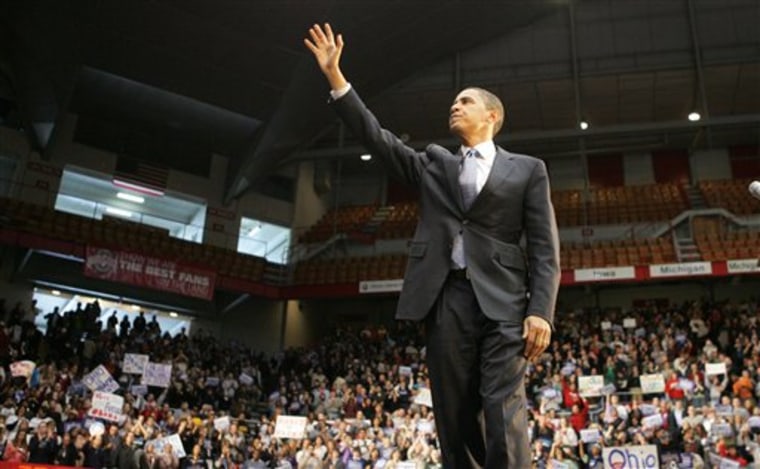While recent campaign talking points seem focused on the nation’s flailing economy and its foreign wars, concerns over Pakistan remain an important, though somewhat less heralded, part of that dialogue.
“The reality is al-Qaida has created a safe haven in Pakistan that in some respects is more effective than what they had in Afghanistan before 9/11,” said NBC News Terror Analyst Roger Cressey.
“It is critical for our long-term strategy against al-Qaida, the Taliban, and Afghanistan.”
Pakistan was brought up early and often on the presidential campaign trail by Democratic contender and Senate Foreign Relations Chair Joe Biden.
At an MSNBC debate in October, the legislator even went so far as to say he feared Pakistan more than Iran.
“What is the greatest threat to the United States of America? 2.6 kilograms of highly enriched uranium in Tehran or an out of control Pakistan? It's not close.”
Biden’s campaign soon ended, and slowly, the topic receded into the background.
But that may have changed over the past week, as political opponents, both Republican and Democrat, have taken Sen. Barack Obama to task over his policy views toward Islamabad.
At Tuesday night’s MSNBC debate in Cleveland, Sen. Hillary Clinton criticized her opponent’s foreign policy experience, saying, “Last summer, he basically threatened to bomb Pakistan, which I don’t think was a particularly wise position to take.”
And speaking at his Wisconsin primary victory party last week, Sen. John McCain also brought up Obama's earlier statements on Pakistan.
"Will we risk the confused leadership of an inexperienced candidate who once suggested bombing our ally, Pakistan?" asked the Arizona senator.
Even after the Wisconsin speech, McCain reiterated his criticism.
The next day, he said, “You make plans and you work with the other country that is your ally and friend, which Pakistan is.”
“You don’t broadcast and say that you’re going to bomb a country without their permission.”
Both Clinton and McCain were making hay of a speech given by Obama in August, when he said he would consider unilateral bombings of al-Qaida camps in Pakistan, with or without consent from Islamabad.
"Let me make this clear: There are terrorists holed up in those mountains, that murdered 3,000 Americans," said Obama during the counterterrorism address.
"If we have actionable intelligence about high-valued terrorist targets and if President Musharraf will not act, we will."
But, despite the criticism, there’s some recent evidence that suggests Obama’s idea of unilateral strikes within Pakistan’s borders may not be that different from current U.S. actions.
Last week, The Washington Post reported that in late January, a CIA aircraft fired on several buildings in the Pakistani town of Mir Ali, killing a senior al-Qaida commander and several others.
The paper, quoting anonymous U.S. officials, said that the action was done without seeking approval from the Pakistani government.
Comparing The Washington Post report to Obama’s take on Pakistan, Cressey said, “There’s not a whole lot of distance between the policy he articulated and what the administration is doing now.”
“The reality is that any president, Republican or Democrat, will unilaterally go after a target when the intelligence is good,” he said, adding, “You’re not attacking an ally; you’re attacking a de facto sanctuary.”
Indeed, former White House Press Secretary Tony Snow resisted commenting on Obama’s opinions in August, but did concede that the administration would “keep all options open if there’s actionable intelligence” when it comes to al-Qaeda targets within Pakistan.
Still, the McCain campaign contends that it was foolish for Obama to announce he would carry out such an attack as president, especially while vying for the White House.
“Before the (Mir Ali) attack, did President Bush or Defense Secretary Gates get up and have a press conference?” asked McCain foreign policy adviser Randy Scheunemann. “Of course they didn’t.”
“You don’t telegraph your punches; you don’t announce to the world that you’re going to do things in a way that could harm your allies.”
It’s criticism that Obama responded to at Tuesday’s debate.
“With respect to Pakistan, I never said I would bomb Pakistan,” said Obama.
“What I said was that if we have actionable intelligence against bin Laden or other key al-Qaida officials and we -- and Pakistan is unwilling or unable to strike against them, we should.”
He went on to compare his position to recent Bush administration actions in the nuclear-armed country.
“And just several days ago, in fact, this administration did exactly that and took out the third-ranking Al Qaida official, “said Obama. “That is the position we should have taken in the first place…the fact is, it was the right strategy.”
While the critical dialogue between McCain and Obama has now shifted back to Iraq in the last couple days, Pakistan will likely re-emerge as the contest moves forward, especially if the Arizona senator continues criticizing his potential opponent’s foreign policy experience.
